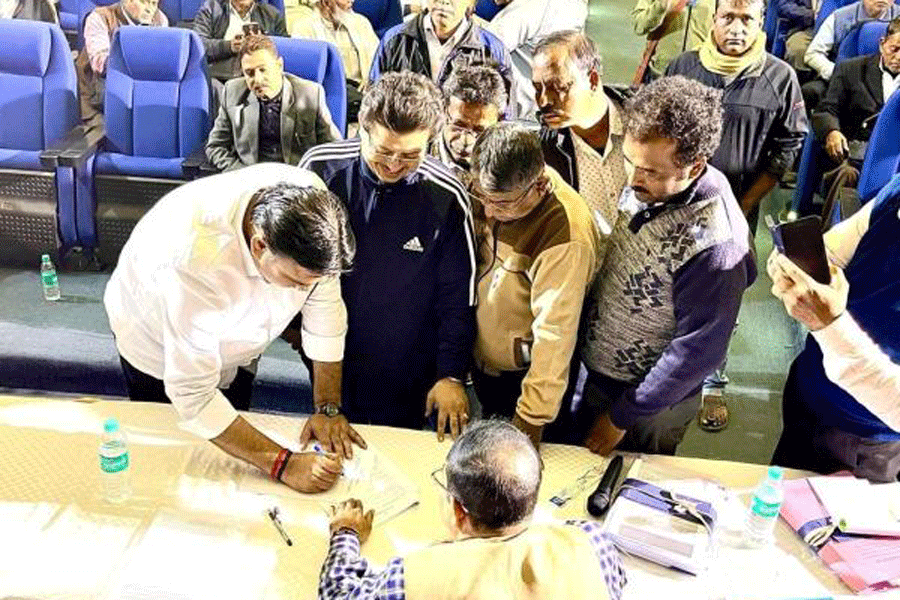Bengal Jute Workers Get Big Boost: Minimum Wage Rises, Perks Galore in New Deal
Government, Unions, Mill Owners Unite in 3-Year Agreement; Labor Cheers, Industry Cautiously Optimistic

By entering into a tripartite agreement with labor unions and leaders of the jute sector, the Bengal government on Wednesday provided many financial perks in addition to raising the minimum daily salary of entry-level jute laborers from Rs 370 to Rs 485.
According to state labor welfare minister Moloy Ghatak on Thursday, the tripartite agreement to raise the pay and provide other financial advantages for almost three lakh jute workers in Bengal would go into effect on February 4, 2024. The agreement will be in force for the next three years.
This kind of agreement was last inked in 2019.
The increase in jute sector pay coincides with Union Textile Minister Piyush Goyal's planned trip to Calcutta later this week. According to industry insiders, the Union minister was anticipated to assess the jute sector's progress, including issues like declining raw jute prices.
The new deal has been praised by labor groups and jute mill owners alike, but they have also voiced concerns about the Center, which is the primary buyer of jute goods, pushing synthetics.
Labor unions demanded a pay increase and other perks from the state government once the last deal ended in early 2023.
A worker will get a gross monthly compensation of Rs 14,066 at the entry level under the terms of the agreement, an increase of almost Rs 3,562 per month. A senior laborer's gross monthly pay will be Rs 17,271, which is Rs 553 higher than what he was previously paid. Workers employed in 2002 would get a salary increase of Rs 627 per month, to Rs 15,837.
A one-time ad hoc payment of Rs 130 per month would also be given to all current laborers, in addition to their basic pay (DA excluded).
The industry leaders reached a unanimous decision to increase the home rent allowance from 5% to 7.5%.
A new hire will get additional significant perks, one of which is an attendance incentive of Rs 20 per day for at least 12 of the 15 days of consecutive attendance. Additionally, those who have worked for 20 years or longer would be considered "permanent," potentially benefiting one lakh individuals.
The government and owners of jute mills reached an agreement to abolish the Provident Fund Trustee Boards and PF accounts of all jute mills and place them under the jurisdiction of the Center's EFPO in an effort to address laborers' PF issues.
The agreement was signed in Ghatak's presence by representatives of the Indian Jute Mills Association (IMJA), 113 separate jute mill owners who are not members of the IMJA, 23 labor unions, and INTTUC.
In addition to praising the agreement, the IMJA highlighted the additional costs associated with the pay increase.
"On February 4, the new pay agreement goes into force. As a result, we expect wage expenses to increase by 5%. The IMJA chairman, Raghavendra Gupta, told The Telegraph that "it will raise operating costs and we have to see how best to manage at a time when there are demand constraints." "Yet worker welfare is something we are committed to."
According to representatives of the labor department, proprietors of jute mills consented to classify their employees as unskilled, semi-skilled, skilled, or highly skilled.
The retirement age for female employees in Bengal's jute industry has been unanimously increased from 55 to 58 years old in another new initiative.
"The agreement is a unique example of inclusivity as demands of all unions have been considered with respect and unlike previous years, Left-backed unions also joined the meeting and signed the agreement," stated Trinamul leader and state INTTUC president Ritabrata Banerjee, calling the agreement "historic."
The head of the Bengal Chatkal Mazdoor Forum, which is associated with the AICCTU, Nabendu Dasgupta, stated: "The new agreement has come as a ray of hope for jute mill laborers."
"Reducing the gaps has largely streamlined the entire employment and wage division process," Dasgupta said.
Additionally, the agreement has examined retirement benefits, guaranteeing that any outstanding payments are paid within the allotted 30-day period. The government and the jute mill business now have to decide how to carry out the choices in the heat of the moment. We will put pressure on the administration to guarantee the implementation right now," he said.





















































